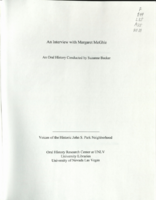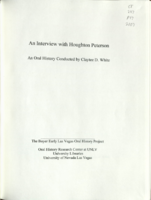Search the Special Collections and Archives Portal
Search Results

Transcript of interview with Alice Doolittle by Christopher Moran, March 21, 1977
Date
Archival Collection
Description
On March 21, 1977, Christopher Moran interviewed Alice Doolittle (born 1897 in Boston, Massachusetts) about her experiences while living in Nevada. Also present during the interview is Ruth Belding, Alice’s daughter. Doolittle first talks about her reasons for coming to Las Vegas and her eventual occupation as a dental assistant. She also talks about her family’s history of living on the Stewart Ranch and the ranch’s swimming pool that attracted many during the summers of Las Vegas. Doolittle also describes her move to Boulder City with her husband, the first theaters in Las Vegas, and the Union Pacific Railroad. At the end of the interview, the three discuss Helen Stewart, Harley Harmon, and the Doolittle Center, named after Doolittle’s late husband, Ferris Doolittle.
Text

Transcript of interview with Dorothy George by Claytee White, October 13, 2003
Date
Archival Collection
Description
After serving as a nurse in World War II in Hawaii, Okinawa and Japan, Dorothy returned home to Chippewa Falls, Wisconsin. She experienced a particularly bad winter and she set out for California but stopped in Las Vegas to visit the family of her traveling companion, a girlfriend from her home town. The girlfriend returned to Wisconsin and George applied for a nursing license and got it within three days. She never left. Dorothy met her husband while working the night shift at Clark County Hospital. He would come in regularly to assist his patients in the births of their babies. Their occupations and their service in World War II drew them together in a marriage that has lasted over fifty years. From 1949 to this interview in 2003, Dorothy George has seen Las Vegas grow from a town that she loved to a metropolitan area that is no longer as friendly. She reminisces about the Heldorado parades, family picnics at Mount Charleston, watching the cloud formed by the atomic bomb tests, raising six successful children, leading a Girl Scout Troop, and working in organizations to improve the social and civic life of Las Vegas.
Text

Transcript of interview with Margaret McGhie by Suzanne Becker, November 21, 2008
Date
Archival Collection
Description
Margaret McGhie was a Depression era child who grew up in western Nevada, where her grandparents were ranchers. Her mother, a native Nevadan, married an Italian immigrant, and she recalls moving a lot. Margaret attended a business college in Reno and eventually moved to Las Vegas, where she worked for Basic Magnesium (BMI) in Gabbs, NV and then later for a remanufacturing company where she verified rocket measurements. Only 16,000 people resided in Las Vegas in post World War II days when she moved there for work as her husband returned from military service. At the time lots for homes were selling in the new development of John S. Park. Using the GI bill the young couple became one of the first home owners on the street. The land had formerly been a ranch and orchard making it a beautiful spot. Due to post-war building material shortages it took nearly two years to finish the house construction. To this day Margaret lives in the home where she and husband raised four children. She recalls the neighborhood fondly and describes some of the activities that kept them busy, where they shopped, and how her children attended John S. Park Elementary School and then the local parochial schools. She describes how the town changed from a 10-minute cross-town drive and how the fact of living close to the Strip had little impact on their life. People moved from the neighborhood as the city grew, she says, moving to newer and nicer homes in Spanish Oaks and then Summerlin. The John S. Park neighborhood has changed from a formerly large Mormon demographic to a notable increase of Latino population. She sees the historic designation as a signal of pride in ownership for residents.
Text

Transcript of interview with Ruth Annette Mills by Lisa Gioia-Acres, November 20, 2008
Date
Archival Collection
Description
Ruth Annette Mills was born and raised in Washington, D.C. She recalls the early years during WWII, her father's cancer and radium treatment under Blue Cross Blue Shield, his passing when she was nineteen, and her marriage that same year. Ruth and her husband and family lived in Georgia, Texas, and Maryland before coming to Las Vegas in 1968. She worked as a typist for the Office of Education at one point and did volunteer work for her church, the Cub Scouts, and the League of Women Voters. She also worked as a clerk-typist for the Clark County School District, and eventually became a teacher through the Teacher Corps program. She graduated in 1975 and was hired to teach 6th grade at CVT Gilbert. The school integration program was just beginning when Ruth was first hired as a teacher. She held the position of facilitator and recalls how angry parents were when they learned their children had to be bussed to sixth grade centers. Having been involved through her church with the Civil Rights Movement in other states, she was disappointed with the racist attitudes she encountered in Las Vegas. Ruth's involvement with health care began when her daughter-in-law developed kidney stones and was denied treatment. In 1993 she started the Nevada Health Care Reform Project through the League of Women Voters in order to support Bill Clinton's health plan. Fifteen years later, over 100 organizations had come on board to support the League's coalition in favor of Clinton's plan, and her fondest wish is that one day Universal Health Care will be available to all Americans.
Text

Transcript of interview with Houghton Hoot Peterson by Claytee White, May 20, 2010
Date
Archival Collection
Description
Houghton Hoot Peterson played trombone in his high school band in northern Minnesota where he grew up. That same instrument would lead him to be a member of the highly regarded Air Force jazz band called Airmen of Note after enlistment. Then during a short tour at Nellis Air Force base, Hoot decided that the Las Vegas entertainment scene might have career opportunities for him. He moved to Las Vegas in 1962, an era of celebrity performers and tourists who enjoyed the crowds and nightlife. Hoot's point of view was as a musician in the band, most often a Strip relief band. But he also has tales of famous musicians and late night jam sessions. Hoot's career spanned 20 years. Eventually the Las Vegas scene for live musicians began to change. When times got tough for Hoot, he worked as a carpenter and at a music store. In this interview he discusses his fascinating past and offers advice for today's musicians.
Text

Transcript of interview with Jelindo Tiberti by Stefani Evans and Claytee D. White, April 18, 2017
Date
Archival Collection
Description
As Jelindo Tiberti describes his childhood as the youngest of five children growing up on 15th Street, he chronicles a seemingly idyllic time of playing with a large group of neighborhood friends, of doing outdoor chores with his brothers, of spending summers at the family cabin in Utah, of high school dances, and as a high school junior, of meeting Sandee, whom he would marry within two months after they both graduated from the University of Southern California. He talks about his parents: about working for and with his namesake father; about taking his mother to her daily radiation treatments, about cooking his mother's recipes, and about his mother making sure her youngest child earned his college degree before he married. He explains the ubiquity of fencing and shares his experience of taking over Tiberti Fence Company, of retiring and selling the company, and of starting over with Red Star Fence Company. Throughout, Tiberti speaks to living with dyslexia: of attending an after-s
Text

Transcript of interview with Stavros Anthony by Claytee White and Stefani Evans, July 24, 2017
Date
Archival Collection
Description
Born of humble beginnings to a sheep farming family in Cyprus, Greece, Stavros Anthony embodies the legacy of the American spirit and ability to reach as far as one can to achieve personal greatness. His family came to the United States in 1955 and moved to Kansas City, Missouri, where his father started working in the restaurant business as a cook until 1967. Moving to Detroit proved to be a benefit for the family, as his father became the executive chef for the Grosse Point Yacht Club, one of the most exclusive clubs in the country. He went from sheep herding, to peeling potatoes, to the executive and afforded his family a typical middle class lifestyle. He graduated from high school in 1975 and attended Wayne State University, earning is B.A. in criminal justice and starting his career in policing with the university’s police department. Upon graduating in 1980, he faced a frozen job industry in Detroit due to a very bad auto recession. He applied for and secured a position as a po
Text

Transcript of interview with Roberta Kane by Barbara Tabach, September 6, 2017 and May 22, 2018
Date
Archival Collection
Description
Roberta “Bobbie” Kane (1932 - ) is the first known Jewish child born in Las Vegas. Her parents, Sallie and Mike Gordon, were liquor stores owners and among the founders of the first Jewish congregation in Las Vegas. Bobbie’s childhood remembrances are as a young girl who was fully aware that “Friday nights were reserved for religious services. Saturdays were always reserved for gin rummy.” In the late 1940s, as a teenager at Las Vegas High School (and 1950 graduate), Bobbie recalls Las Vegas as a small town and a joyful place to grow up. She briefly attended University of Southern California before marrying and beginning her family. In time, life brought her back to live with her parents. She pursued a career working for the Desert Inn group of hotels and helped open the Stardust in 1957. She was mentored by Mark Swain, “a six foot-four hunk of a cowboy” who worked for Moe Dalitz. This experience included driving Mark’s pink Cadillac to pick up hotel guests. This provided her with a
Text

Transcript of interview with Norma and Gil Schwartz by Stefani Evans, September 22, 2017, October 4, 2017, & February 14, 2018
Date
Archival Collection
Description
It's been live, love, and laugh ever since we met. We've been married now thirty-three years. Even for a ninety-three-year-old man, thirty-three years is a long time. For Gil Schwartz, thirty-three years is nearly one-third of his life. The former real estate broker, who was raised in Rye, New York, learned the business by working with his father and then forming his own property management company in Manhattan. In 1959, with two children in tow, Gil moved to Las Vegas, where he soon took temporary quarters at Twin Lakes Lodge and he and his children learned to ride horses. In this interview, Schwartz recalls how horseback riding gave him an instant network of friends through working on the annual Helldorado Days and joining the Sheriff's Mounted Posse. He talks about Sahara Realty, the real estate brokerage he founded in 1964 and sold in 1983, and he shares his experiences 1967–68 in negotiating options to buy about one hundred parcels of unimproved land for Herb Nall, who represe
Text

Brian Greenspun interview, 2018: transcript
Date
Archival Collection
Description
Interviewed by Barbara Tabach. Publisher of Las Vegas Sun, child of Hank and Barbara Green. Part 1 Subjects: Las Vegas Sun, Greenspun family, Israel gun running; Part 2 subjects: Journalism importance, Las Vegas Sun, Watergate tie-in with Hank's safe, October 1 shootings reflections; Part 3 subjects: Hank and Barabara Greenspun. Talks about Jewish visionaries of Las Vegas that includes Art Marshall, Jack Entratter, Sheldon Adelson, Nate Mack; Part 4: Interviewed by Barbara Tabach. Las Vegas Sun newspaper publisher and native Las Vegan talk about events and people from Las Vegas' years of him growing up. From watching pink smoke from test site to hanging out with friends in the John S. Park neighborhood to racial riot of 1969 to playing golf as a kid.
Text
